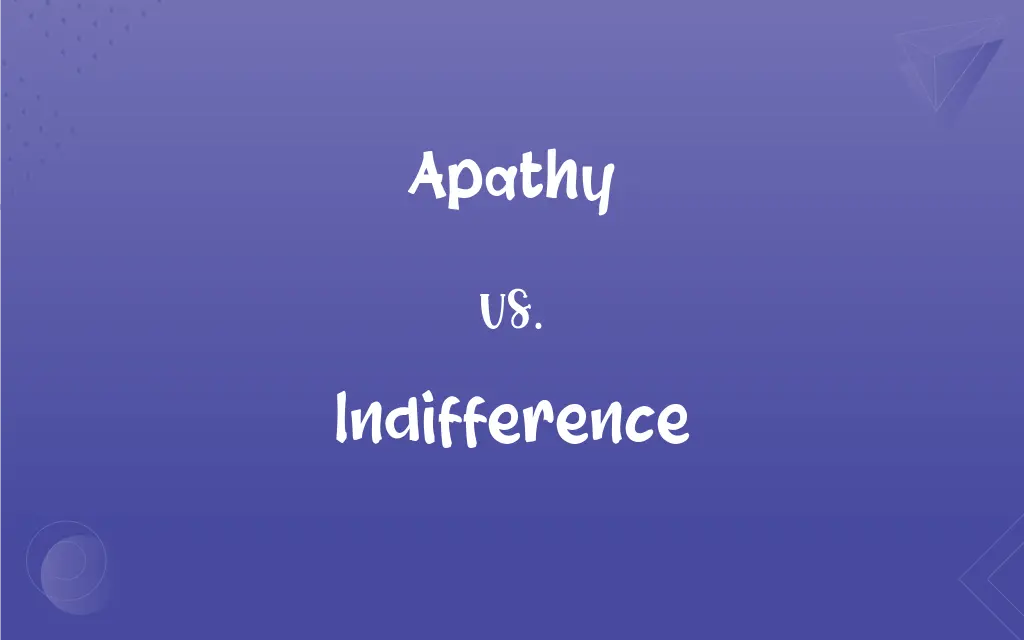Apathy vs. Indifference: What's the Difference?
Edited by Harlon Moss || By Janet White || Updated on September 18, 2023
"Apathy" denotes a lack of interest, enthusiasm, or concern, often implying emotional detachment. "Indifference" implies a lack of preference or partiality but doesn't necessarily indicate a lack of emotion.

Key Differences
"Apathy" generally implies an emotional numbness or absence of feeling towards an issue or situation. "Indifference," on the other hand, suggests a conscious choice to remain neutral or to not take sides.
In "Apathy," the individual often exhibits a lack of care, concern, or motivation. In contrast, "Indifference" may be the result of weighing the pros and cons and deciding that the issue at hand is not worth becoming emotionally invested in.
"Apathy" can be seen as a more intense form of "Indifference" in some contexts. It goes beyond merely not caring about something to being emotionally unresponsive or disengaged.
"Apathy" can sometimes be a symptom of certain medical or psychological conditions, indicating a deeper issue. "Indifference," however, is often situational and can be a strategic stance, as in diplomatic matters.
Comparison Chart
Part of Speech
Noun
Noun
ADVERTISEMENT
Emotional Involvement
Emotionally Detached
May or May Not Be
Intensity
More Intense
Less Intense
Medical Context
Sometimes
Rarely
Conscious Choice
Rarely
Often
Apathy and Indifference Definitions
Apathy
Emotional numbness.
She felt apathy after the breakup.
ADVERTISEMENT
Indifference
Emotional neutrality.
Her indifference was evident when she didn't react to the news.
Apathy
Lack of motivation to act.
Apathy stopped him from pursuing his goals.
Indifference
Lack of preference.
His indifference made choosing a restaurant difficult.
Apathy
Lack of interest in activities.
His apathy toward schoolwork concerned his parents.
Indifference
Lack of concern.
The employee's indifference to the rules was troubling.
Apathy
Absence of emotion or enthusiasm.
Apathy settled in after she heard the bad news.
Indifference
Disinterest.
His indifference to politics kept him from voting.
Apathy
Unresponsiveness to stimuli.
His apathy was actually a symptom of depression.
Indifference
Unbiased stance.
The judge showed indifference while handling the case.
Apathy
Lack of interest or concern, especially regarding matters of general importance or appeal; indifference.
Indifference
The state or quality of being indifferent.
Apathy
Lack of emotion or feeling; impassiveness.
Indifference
The state of being indifferent.
Apathy
Lack of emotion or motivation; lack of interest or enthusiasm towards something; disinterest (in something).
Indifference
Unbiased impartiality.
Apathy
Want of feeling; privation of passion, emotion, or excitement; dispassion; - applied either to the body or the mind. As applied to the mind, it is a calmness, indolence, or state of indifference, incapable of being ruffled or roused to active interest or exertion by pleasure, pain, or passion.
A certain apathy or sluggishness in his nature which led him . . . to leave events to take their own course.
According to the Stoics, apathy meant the extinction of the passions by the ascendency of reason.
Indifference
Unemotional apathy.
His daughter's indifference towards the sexist group made him wonder if she was even human.
Apathy
An absence of emotion or enthusiasm
Indifference
A lack of enthusiasm.
Apathy
The trait of lacking enthusiasm for or interest in things generally
Indifference
Unconcerned nonchalance.
Indifference
(philosophy) Self-identity defined through the negation of difference, non-difference.
Indifference
The quality or state of being indifferent, or not making a difference; lack of sufficient importance to constitute a difference; absence of weight; insignificance.
Indifference
Passableness; mediocrity.
Indifference
Impartiality; freedom from prejudice, prepossession, or bias.
He . . . is far from such indifference and equity as ought and must be in judges which he saith I assign.
Indifference
Absence of anxiety or interest in respect to what is presented to the mind; unconcernedness; as, entire indifference to all that occurs.
Indifference can not but be criminal, when it is conversant about objects which are so far from being of an indifferent nature, that they are highest importance.
Indifference
Unbiased impartial unconcern
Indifference
Apathy demonstrated by an absence of emotional reactions
Indifference
The trait of lacking enthusiasm for or interest in things generally
Indifference
The trait of remaining calm and seeming not to care; a casual lack of concern
FAQs
Is Indifference a conscious choice?
Often, indifference is a conscious decision to not take sides or get emotionally involved.
What does Indifference mean?
Indifference means a lack of preference or partiality, without necessarily lacking emotion.
Is Apathy more intense than Indifference?
Generally, apathy is considered more intense as it implies emotional detachment.
What does Apathy mean?
Apathy means a lack of interest, enthusiasm, or concern, often emotionally.
Does Apathy imply inaction?
Apathy often leads to inaction due to a lack of motivation or concern.
Is Apathy always negative?
Apathy is often perceived as negative but can be a coping mechanism in some situations.
Is Indifference always disinterest?
No, indifference can be the result of weighing options and deciding not to take a stance.
Is Indifference the same as neutrality?
Indifference may imply neutrality but it can also suggest a lack of concern.
Can Apathy be a medical symptom?
Yes, apathy can sometimes be a symptom of medical or psychological conditions.
Can you be indifferent but not apathetic?
Yes, you can be indifferent without being apathetic, as indifference doesn't necessarily imply a lack of emotion.
Are Apathy and Indifference interchangeable?
While similar, they are not interchangeable; apathy implies emotional detachment, whereas indifference is often a conscious choice.
Can Indifference be strategic?
Yes, indifference can be a strategic stance, especially in diplomacy or negotiations.
Can Apathy be temporary?
Yes, apathy can be temporary, especially if it's situational.
Can Apathy affect relationships?
Yes, apathy can negatively impact relationships due to emotional detachment.
Can Indifference be a defense mechanism?
Sometimes, indifference acts as a defense mechanism to avoid emotional involvement.
About Author
Written by
Janet WhiteJanet White has been an esteemed writer and blogger for Difference Wiki. Holding a Master's degree in Science and Medical Journalism from the prestigious Boston University, she has consistently demonstrated her expertise and passion for her field. When she's not immersed in her work, Janet relishes her time exercising, delving into a good book, and cherishing moments with friends and family.
Edited by
Harlon MossHarlon is a seasoned quality moderator and accomplished content writer for Difference Wiki. An alumnus of the prestigious University of California, he earned his degree in Computer Science. Leveraging his academic background, Harlon brings a meticulous and informed perspective to his work, ensuring content accuracy and excellence.































































